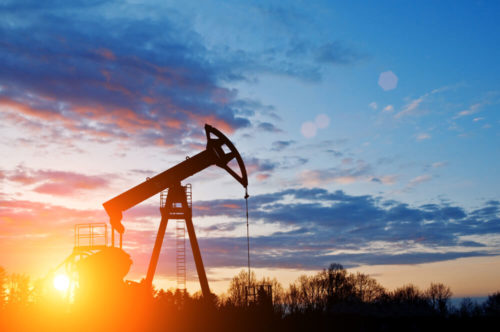Despite the Green New Deal in the US and Europe and central banks’ focus on climate change, old-school energy stocks have been the standout performers over the past few months. While the Dow Jones Industrial Average Index broke records with seven straight weekly declines, the oil price held up and oil stocks did well as a result.
But I think that run is over. Because the two most likely outcomes for the big stories affecting the oil price are both bad news. Well, good news, if you want the oil price to come down…
Indeed, the oil price is a key part of the cost of doing just about anything in our economy. So when the oil price rises, everything becomes more expensive. And that means less economic activity overall.
It’s a good example of the sort of stagflationary force that has delivered moribund economic growth coupled with inflation — a combination economists considered impossible until it punched them in the face in the ‘70s. That actually occurs a lot in economics…
Anyway, the oil price has the power to raise inflation and cut economic activity at the same time. A painful combination that’s playing out around the world right now.
More importantly, it’s a combination that leaves policymakers in a bit of a bind. What can they do in the face of inflation and falling GDP? Both stimulus and tighter policy look bad.
But what if this argument about the relationship between oil and the economy confuses cause and effect? The oil price isn’t just an input for economic activity, it’s also a consequence of it.
Which brings me to the two possible outcomes I see for oil. Neither of which are good for energy investors.
In my view, either the current high oil price will trigger a recession in the US and Europe, which causes demand to fall and thereby the oil price to fall with it, or politicians will seek to prevent this recession by easing the sanctions on Russia and bringing the oil price down.
Before we dig into those two scenarios, the first thing to note is that both can happen rather rapidly and come as a surprise. Economists are not expecting a recession in major economies — yet. And the Ukraine war looks set to drag on. But I’m not convinced those two possibilities are probable.
Consider, first of all, that the pain of high oil prices is very much self-imposed. And not just because of Russia and Ukraine and sanctions.
Governments have made a colossal mess of oil exploration, discovery, investment, production, taxation, transport, and trade in an incredibly long list of ways.
Pipelines that were prevented or won’t come online, environmental restrictions prevented investment, less oil leases on government land cut supply, restrictions on investors looking to invest in oil producers withdrew funding, sanctions prevented payment for oil, and endless other examples of meddling are all bizarre government policies that have impacted oil supply (many of them deliberately). But they’re also interventions that can change with the flick of a pen.
Obviously, it’ll take oil decades to recover from the chaos those policies imposed. But there’s still plenty of oil production that can come online in the short run too, if the government would only let it.
Let’s focus on the geopolitical drama for a moment. US sanctions on Russia, as my friend Jim Rickards keeps pointing out, are mostly set to come into effect later this year. For all the posturing and drama, the real action is yet to hit oil and gas.
But this may actually be a political punt that the situation in Ukraine can be resolved before the sanctions really start to bite.
What makes me think so? Well, ask yourself, bite who exactly?
It won’t come as a surprise to either of us that sanctions which restrict Russian energy exports do most of their damage to those who are importing Russian energy. (Hint: not Russia.)
Even the European politicians have figured this out. As the president of the European Commission recently explained, ‘if we were to completely cut off the oil, he [Putin] might be able to take the oil that he does not sell to the European Union to the world market, where the prices will increase, and sell it for more, and that’ll fill his war-chest’.
And so the Europeans have fudged their own sanctions package sufficiently to allow Russian oil into Europe, except by sea shipments. Which is an absolute cracker if you bother to look at a map.
But the Europeans may not escape the consequences of their meddling. Maartje Wijffelaars, Elwin de Groot, and Erik-Jan van Harn of Rabobank, who I’ve only named because of their names, have published research which suggests that US sanctions on Russia will push the EU into a recession.
But here’s the thing: a recession in the EU would likely mean a significant drop in oil demand. And so oil prices would fall.
Either way, I’m expecting a drop.
Where does all this leave Australia?
I think it’s time to revive the idea of a two-speed economy. This time, it’s not just mining, but energy which is caught up in an international boom of a dubious nature.
Unfortunately, energy prices are to a great extent global. So the segment of Australia which doesn’t work for or own energy shares is left out in the cold, paying whopping energy costs.
Hence the idea of two-speed. The energy sector does well, the rest of us don’t. But if I’m right about the prospects for a recession or de-escalation in Ukraine, that could be about to change, fast.
Just as the world’s investment community is currently asking itself how bad things must get before central bankers suddenly pivot from interest rate hikes to cuts, you also need to ask yourself how high the oil price needs to go before the political pain is big enough to force an about-face on the policies which pumped oil above US$100 in the first place.
I think we’re close, on both counts.
Until next time,
 |
Nickolai Hubble,
Editor, The Daily Reckoning Australia

